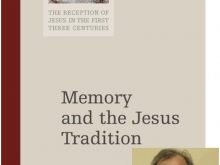The Memory Mavens, Part 5: Rituals and Remembrance (2)
This is the second section of Part 5: Rituals and Remembrance. In the previous post, I tried to explain how modern Memory Mavens often read Maurice Halbwachs selectively. For example, Barry Schwartz (see Part 3) and Anthony Le Donne (see Part 5.1) inexplicably failed to read the earlier chapters of The Legendary Topography of the Gospels in … Continue reading “The Memory Mavens, Part 5: Rituals and Remembrance (2)”
